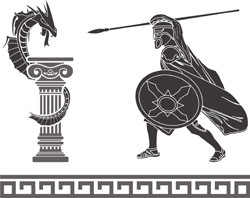The cradle of civilisation in the literary canon
Literary works deemed contextually relevant to a particular time period or place establish a literary cannon. Such a collection can be used to address historical or contemporary events. However, just as the works that comprise them and the judgements of those who create them constantly change, so do literary canons. Although the content of a work included in a cannon does not change, the meaning extrapolated from it can. This is a result of changes in people's thoughts and experiences. Against this background, the project 'Greek fantastic literature: A case of censorship in a European literary canon' (GFL - CCELC) aimed to discover variations of the fantastic contributing to the construction of 'Greekness' in Greek and European discourses of modernity. Research focused on the uncanny, attempting to outline its overlapping with the emergence of the modern concept of (phil) Hellenism. The latter is generally regarded and explained in terms of efforts to resuscitate Greece as a rational and aesthetic utopia in an enlightened Europe. Specifically, the project examined foreign discourses about Greece, and then considered the reception and re-elaboration of such discourses in the Greek space. The first included travel accounts, treatises on vampires or revenants, philhellenic literature, and fantastic literature or cinema associated with Greece. The second looked at national literature, the construction of the literary canon, cinema and other relevant works. Elements such as the vampire were primarily associated with Greece from the 16th to the 18th centuries in the west. Although these were then purified of all Hellenic connections, their study offers an opportunity to track the unconscious uncanny implications in discourses of (phil) Hellenism. GFL - CCELC also explored the cultural, historical and representational effects that the western understanding of Greece had in the internal construction of the nation. Furthermore, it sought to understand the mechanisms of mental or metaphorical colonisation these effects reveal. Project work strived to also establish a methodological grounding in the fields of nation studies, cultural studies, psychoanalysis, literary theory and philosophy. Research results and the knowledge generated are relevant to contemporary studies given the turmoil modern Greece is going through. GFL - CCELC thus also challenges staid approaches to the study of modern identities in the context of growing globalisation.
Keywords
Civilisation, literary cannon, Greece, fantastic literature, philhellenism



